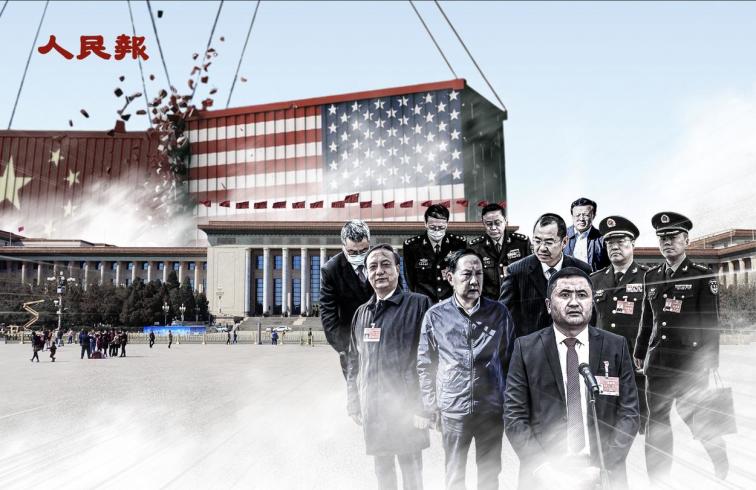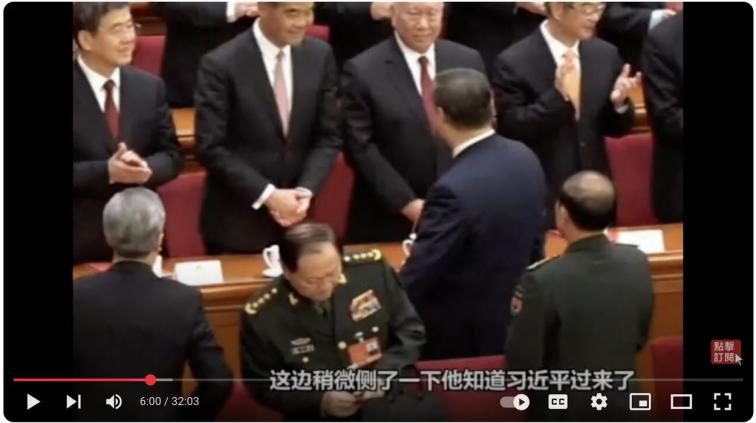Zhang Youxia counterstrikes against Xi Jinping (People News illustration)
[People News] The Chinese Communist Party’s 20th Fourth Plenary Session concluded on the afternoon of October 23. The communiqué showed that the only addition to the Central Military Commission (CMC) was Zhang Shengmin, who was promoted to vice chairman. The rumored resignation of Xi Jinping as chairman of the CMC did not happen. Currently, the CMC has only four members. Li Shangfu, the defense minister promoted by Xi, was not elevated to the rank of CMC member. Some analysts believe that within the military, the anti-Xi faction represented by Zhang Youxia and Xi Jinping fought to a draw in this round of confrontation, but the fierce standoff between the two sides will continue. Others think there is no real force in the military capable of challenging Xi; the only factor that could change the situation is Xi’s health.
According to Xinhua News Agency on Thursday (October 23), 67-year-old Zhang Shengmin was promoted to vice chairman of the CMC. The communiqué stated that eleven alternate Central Committee members—Yu Huiwen, Ma Hancheng, Wang Jian, Wang Xi, Wang Yonghong, Wang Tingkai, Wang Xinwei, Wei Tao, Deng Yiwu, Deng Xiuming, and Lu Hong—were made full members. This is the largest personnel change since 2017.
The replacements skipped over several figures: Rocket Force deputy commander Wang Liyan, Joint Logistics Support Force commander Wang Kangping, vice minister of education Wang Jiayi, CMC General Office director Fang Yongxiang, Xi’an Party Secretary Fang Hongwei, Yunnan CPPCC deputy Party secretary Shi Yugang, and Northern Theater Army commander Shi Zhenglu.
During the 18th and 19th Party Congresses, similar leapfrog replacements occurred. Being bypassed does not necessarily mean being purged, but this round’s unusually high number stands out. Many analysts say that while civilian officials may be unaffected, military figures could be under investigation.
After the Fourth Plenum’s reshuffle, the CMC lineup is as follows: Xi Jinping remains chairman; Zhang Youxia continues as vice chairman; Zhang Shengmin, formerly CMC discipline inspection chief, becomes the second vice chairman; and Liu Zhenli, chief of the Joint Staff Department, remains a member.
Zhang Shengmin, who also served as head of the CMC Discipline Inspection Commission and Supervisory Commission, was in charge of anti-corruption in the military. Now, as CMC vice chairman—second only to Xi—he replaces former vice chairman He Weidong, who was expelled from the Party and military last week.
The 67-year-old Zhang Shengmin came from the Rocket Force (formerly the Second Artillery Corps) and is a political officer by training. He once served as director of the Political Research Office in the PLA General Political Department, then as political commissar of the Second Artillery Command College, director of the Second Artillery Political Department, and later political commissar of the CMC Training and Management Department and the Logistic Support Department. Since 2017 he has been CMC Discipline Inspection chief.
Notably, on November 2, 2017, the CCP held the first promotion ceremony of Xi’s new term following the 19th Party Congress. Zhang Shengmin was the only officer promoted to general at that ceremony—a highly unusual move interpreted as Xi’s extraordinary favor.
The Rocket Force and Logistic Support Department—Zhang’s former posts—were both prime targets in Xi’s anti-corruption campaign, yet Zhang remained untouched.
In May 2025, Zhang represented the military at the CCP’s 7th National Conference for Disabled Role Models and Contributors to Disability Work. Hong Kong media noted that disability affairs in the military are usually overseen by the Political Work Department, suggesting Zhang had replaced Miao Hua as head of that department, possibly even holding both posts concurrently.
The Political Work Department functions like the CCP’s Organization and Propaganda Departments combined within the military—responsible for ideology, propaganda, organizational affairs, and senior officer evaluations—hence wielding immense power.
What does Zhang Shengmin’s promotion mean for the CMC power structure?
Political commentator Chen Pokong analyzed in his program that Zhang’s promotion was the result of tug-of-war between Zhang Youxia and Xi Jinping. Originally the CMC had seven members; with He Weidong, Miao Hua, and Li Shangfu all removed, only four remain. Liu Zhenli and Zhang Youxia are a “steel alliance,” while Dong Jun, the defense minister, was not included. The outcome, Chen said, was a stalemate between Xi and Zhang Youxia.
Chen explained that if Liu Zhenli had been promoted to vice chairman, Zhang Youxia would have gained the upper hand. Since Zhang Shengmin was promoted instead, it signals a balance between the two.
Although Zhang Shengmin, like Xi, hails from Shaanxi and was promoted by Xi, Chen believes he may now lean toward Zhang Youxia. Before the Third Plenum he relied on Xi; afterward, he might switch sides.
Chen pointed out that as former Rocket Force political commissar, Zhang could not remain unscathed amid the Rocket Force purge. Facing danger, he chose to side with Zhang Youxia. As head of the military discipline inspection commission, he helped take down He Weidong and Miao Hua and pushed to publicize the investigation before the Fourth Plenum—moves unlikely without his support for Zhang Youxia.
Chen added that since Liu Zhenli is tightly allied with Zhang Youxia, Xi opposed his promotion to vice chairman, settling on Zhang Shengmin instead. Defense Minister Dong Jun—favored by Xi and Peng Liyuan—also failed to enter the CMC or become state councilor, possibly due to opposition from Zhang Youxia’s camp. His career prospects now appear shaky.
Chen summarized that after the Fourth Plenum, the CMC remains highly abnormal—almost collapsed:
-
The CMC still lacks a full roster, shrinking from seven members to four, each having to cover multiple roles.
-
Zhang Shengmin, a vice chairman but not a Politburo member, is an unprecedented case.
-
Defense Minister Dong Jun is neither a CMC member nor a state councilor—also rare.
Therefore, Chen concluded, this confrontation does not mean Xi has won.
Independent scholar Wu Zuolai agreed, saying Xi did not win and Zhang Youxia gained modestly.
Wu predicted that after the Plenum, the situation would enter a strategic stalemate: all factions must face the economic crisis together, and elders will not support a military overthrow of Xi. Only if Xi could use the Plenum to remove Zhang Youxia would it be a decisive victory—but clearly, he lacked that power.
Instead, Wu noted, Zhang Youxia scored small gains—Zhang Shengmin cooperated in “anti-corruption” targeting Xi’s allies and was rewarded with the vice chairmanship, forcing Xi to compromise. The military even pre-announced the purge of nine generals before the Plenum, effectively cornering Xi. Unlike in the Xu Caihou case years ago—when Xi personally led the crackdown—he now clearly resists seeing his loyalists purged. Ultimately, Xi settled for keeping his post while retreating to a holding position for two years—perhaps using the time to prepare another comeback attempt.
The X platform user “Xiaoxiaosheng” voiced a similar view: the Fourth Plenum ended in stalemate—no winners or losers. Interpretations vary, but one thing is certain: the struggle will continue and intensify. After the 20th Congress, there was the “Li Keqiang phenomenon”; after the Fourth Plenum, will a similar episode occur? If a 68-year-old can “die naturally,” then so can someone in their 70s.
Regarding Zhang Shengmin not entering the Politburo, some say Xi feared that having CMC representation there would expand the military’s political influence. However, there is precedent: past vice chairmen joined the Politburo later.
Independent commentator Cai Shenkun, skeptical of rumors that Xi will be forced out, said he shares the public’s wish for Xi to step down—but at present, there is no internal power capable of checking him, either within the Party or the army, nor is there international pressure against his authoritarian rule. How long Xi’s one-man show continues depends on his health; once he becomes frail, those around him will eventually tear off their masks and begin a new round of infighting. Only then, Cai said, might China see a real turning point.
Observers conclude that even with Zhang Shengmin’s promotion, the CMC gained no new members. The internal power balance remains much as before the Plenum—jointly managed by Zhang Youxia, Zhang Shengmin, and Liu Zhenli. Xi may already have lost substantial control over the military, standing isolated. Though Zhang Youxia did not remove Xi from the chairmanship, Xi also failed to weaken Zhang’s grip on the army. Compared with purged figures like He Weidong and Miao Hua, Liu Zhenli is clearly closer to Zhang Youxia, while Zhang Shengmin, though nominally neutral, appears tilted toward Zhang’s side. In the near term, Xi will struggle to rebuild his personal “loyalist army.” In the continuing power struggle within the military, Zhang Youxia likely holds a slight advantage.△










News magazine bootstrap themes!
I like this themes, fast loading and look profesional
Thank you Carlos!
You're welcome!
Please support me with give positive rating!
Yes Sure!